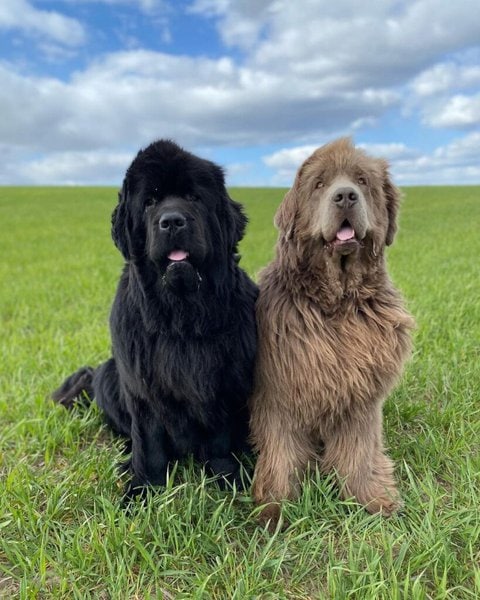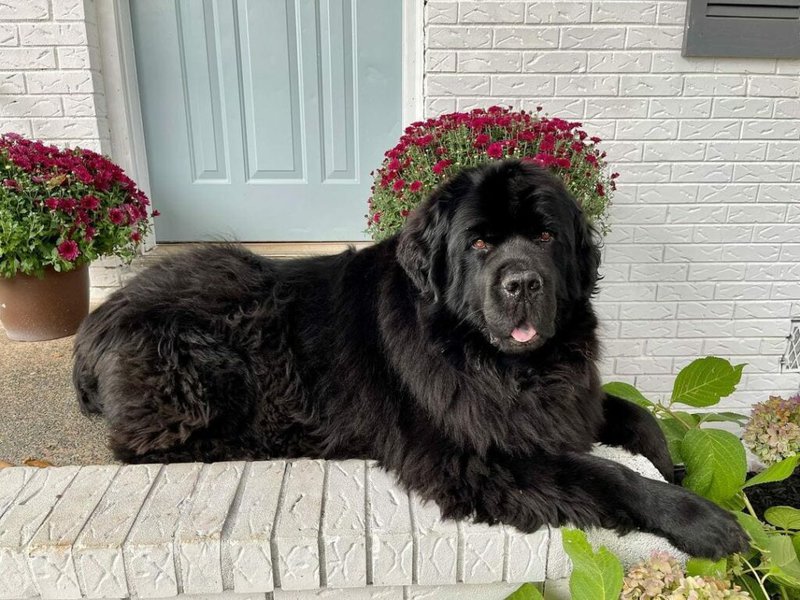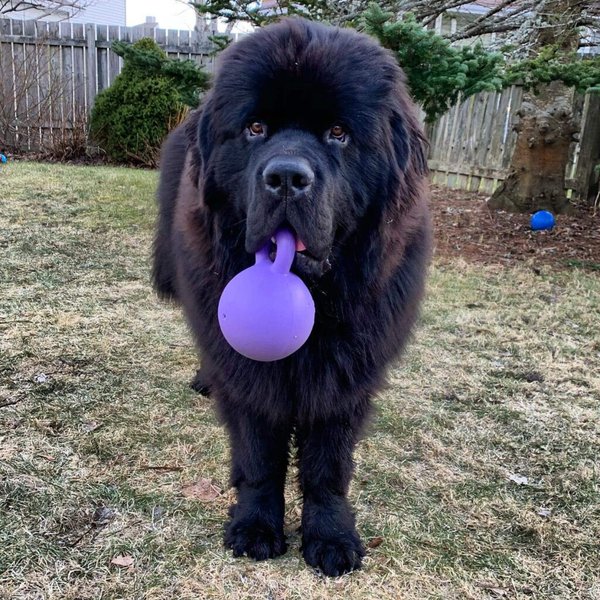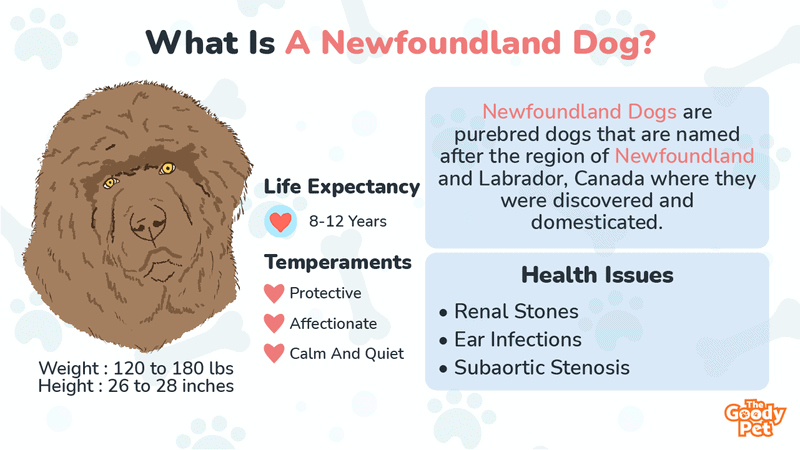The term ‘gentle giant’ is thrown around quite a lot when it comes to large dog breeds with a few positive personality traits here and there. However, few dog breeds actually live up to this title as well as the Newfoundland Dog.
Newfoundland Dogs are purebred dogs that are named after the region of Newfoundland and Labrador, Canada where they were discovered and domesticated. They are popularly referred to as Newfies and are widely known for their large build and surprisingly gentle temperament.
There is a lot that you need to know and prepare yourself for before you get a Newfoundland as a pet. Everything from their large size to their breed-related health trends will influence their care needs and you therefore cannot afford to take this commitment blindly. To help you out, here is a comprehensive guide of everything that you need to know about Newfoundland Dogs. Let’s get things started by taking a look at what makes Newfies special.
Are Newfoundland Dogs Good Pets?
The Newfoundland is considered one of the best dog breeds to keep as a family pet, according to the American Kennel Club. They are also fantastic for companionship in solo setups and may even be worth considering as a first time pet with adequate research and preparation.
Here are just a few things that Newfies are known for so you can get some perspective on exactly why they are so popular.
Their Niche Aesthetic And Size
There is a huge fanbase and market in the dog lovers community for giant dog breeds and the Newfoundland Doggie is perfect for the job.
Newfoundland Dogs can grow as large as 26 to 28 inches in height and 120 to 180 lbs in weight. Their long, fluffy coats just exaggerate the already mammoth features which earns the Newfie the ‘giant’ part of their gentle giant nickname.
Their Versatility
Newfoundland Dogs were in the past used as working dogs in many different capacities. Their instinctive love for the water, protective nature, and high intelligence made them perfect for use as water rescue dogs which is why they were so popular among fishing communities.
Newfies were also used to haul carts with their large build and strength coming in very handy for this.
More recently, Newfoundlands are popularly kept as companions and even in some cases to offer personal protection. This is one dog with a lot of hats to wear.
They Are Not High-Maintenance
The Newfoundland Dog’s large size often has people assuming that it is a high-maintenance dog breed. In fact, a Newfie is easy to be groomed and usually does not bother its owner too much.
Although Newfies have higher upkeep costs largely due to food expenses, they require only some level of effort and time from owners to keep them happy as they are highly independent and easy-going doggies.

What Do Newfoundland Dogs Die From?
Newfoundland Dogs have a lifespan of between 8 and 10 years. However, it is not uncommon to find some living for as long as 12 years.
The somewhat short life expectancy is not so much because Newfoundland doggies are sickly but is instead as a result of their large size. If anything, Newfoundland Dogs tend to be very healthy, especially if selectively bred to eliminate common hereditary diseases.
As a potential Newfie owner, it is still crucial to have an idea of the common health issues that Newfoundland doggies have. Here are the most important things that you should know about.
Subaortic Stenosis
Subaortic stenosis is a congenital heart disease that may prove fatal for Newfies if it is not detected and managed in time.
It is characterized by outflow obstruction from the heart and manifests as difficulty breathing, fainting spells, and generalized weakness during the Newfie’s puppy stage.
Gastric Dilatation-Volvulus
Gastric dilatation-volvulus is another condition in Newfoundland that often results in death if not treated promptly. It is very common in large dog breeds and involves twisting of the stomach usually after meals.
Ear Infections
Newfoundland doggies are prone to developing ear infections both as a result of the size of their ears and due to their love for the water. The good news is that they are easily preventable by good grooming techniques, including properly wiping the ears after swimming sessions or baths.
Renal Stones
Newfies often suffer from a condition known as cystinuria which means abnormal levels of the amino acid cystine in the dog’s urine. The imbalance is often associated with the formation of kidney stones which may block and irritate the dog’s urinary tract.

How To Take Care Of Newfoundland Dogs?
As we mentioned earlier, Newfoundland Dogs are relatively easy to take care of despite their large, intimidating size. However, you cannot simply wing it as their larger size means that their needs are somewhat different from that of any other dog breed you may be familiar with.
To help you take good care of your Newfie pooch, here are 2 of the most important needs you need to address as well as how best to do it for the sake of your dog.
Dietary Needs
Newfoundland Dogs have very big appetites. They also have high caloric needs due to their large size. In terms of portions, an adult Newfie should have between 4 to 6 cups of food divided into 3 meals per day.
Balance is also very important when it comes to a Newfoundland’s dietary needs. Proteins should make up most of their diet at about 22 to 24%, whereas fats come in at a close second at about 15%.
We recommend Pet Plate whose vet-approved recipes offer a truly balanced diet for your Newfie.
Do not forget the very important micronutrients like minerals and vitamins which are useful in pretty much every system in the dog’s body. For this, you may want to include multivitamin supplements to their diet.
Exercise Needs
Despite popular beliefs, Newfoundland Dogs are not lazy nor do they sleep any more than any other dog breed.
To be fair, Newfies do enjoy just chilling and napping if there isn’t anything more for them to do. However, they are usually more excited to play and spend time with their favorite humans.
For the sake of their physical health and mental wellbeing, we recommend you set aside about 30 minutes to an hour every day for exercise. Ideally, this time block should be broken up into two different sessions.

Are Newfoundlands Aggressive? Temperaments Of Newfoundland Dogs
Newfoundland Dogs surprisingly have a reputation as being aggressive among people unfamiliar with the breed. This is probably due to their large size and intimidating faces. However, Newfies are probably among the sweetest dog breeds out there you will come across.
Here are just some of the personality traits that you have to look forward to.
Calm And Quiet
Newfoundland Dogs are quiet and calm dogs and are ideal if you want a dog that doesn’t bark a lot. They are more likely to use physical cues like staring at you or touching you to get your attention.
However, they may still bark when excited or scared.
Affectionate
One of the Newfoundland’s favorite pastime activities is cuddling. These affectionate dogs are happiest in the company and in contact with their favorite human friends. This makes them perfect companions.
Protective
Newfies may not be aggressive but they will not hesitate to intervene and protect you when they feel you are threatened in one way or another.
More often than not, they offer protection by coming between you and the perceived danger and growling as a warning. It is only in very high tension scenarios that they will attack.
Intelligent And Easy To Train
Newfoundland Dogs are also very smart dogs and are always eager to please which makes them easy to train. This is without a doubt as a result of their history as working dogs where they got used to learning and obeying commands.
Independent
The Newfie’s independent nature is another reason why they are perfect if you want a low-maintenance dog. You can easily leave your Newfoundland alone for a few hours for work or as you run errands and they won’t have too much of an issue with it.

Do Newfoundland Dogs Shed? Grooming Tips For Newfoundland Dogs
Probably the only somewhat high-maintenance aspect of taking care of a Newfie is their grooming. The beauty of their long, fluffy coats comes at a price as you have to work extra hard to keep it beautiful and healthy while also minimizing the amount of shedding around your home.
Speaking of shedding, Newfoundland Dogs shed minimally to moderately for most of the year. However, they go through 2 seasons of heavier undercoat shedding during fall and spring where your care practices may need to change.
Whether it is heavy shedding season or you want to deal with some funky smells from your Newfie’s coat, here are two of the most important things you need to know about grooming these dogs.
Deshedding And Detangling
When the Newfoundland is shedding minimally, you can brush their fur 2 to 3 times a week. However, heavy shedding seasons demand a bit more effort, in terms of coat care, in which case you should increase the number of times you brush your Newfie to 4 per week.
The choice of deshedding and detangling tool is also very important considering how dense the Newfoundland’s coat is. The Furminator Undercoat Tool is one of the few brushes on the market that will actually get the job done right with its strong, metallic bristles.
Washing
Newfoundland Dogs can get smelly if they are not properly and regularly groomed. The funky odors can come from anywhere including dirty ears, drool accumulation, dental health issues, and even anal gland diseases.
However, it is the coat that is usually the culprit when a Newfie gets stinky which is why you have to wash them every 6 to 8 weeks.
It is also important that you invest in a good quality shampoo and conditioner. Mighty Petz 2-In-1 Oatmeal Dog Shampoo And Conditioner is perfect for Newfies whose odor is as a result of skin diseases as the oatmeal helps to offer relief and promote healing.
This product is also an awesome option to consider for Landseer Newfoundland Dogs. Their predominantly white coats need a bit more care to keep them clean and bright.
Related Questions
How Much Should I Pay For A Newfoundland Puppy? A Newfoundland puppy will cost you between $1,200 and $3,000 from most breeders. However, it is possible to find Newfies with price tags as high as $9,500, especially if they are bred from what are considered prized Newfoundland bloodlines. Taking care of a Newfie may also be a bit more expensive than smaller dogs with the average yearly expenses ranging from $1,500 to $2,000 for most of these dogs.
Should I Get A Newfoundland? Whether or not you should get a Newfoundland depends on your preferences and the sacrifices you are willing to make. You should definitely consider getting a Newfoundland Dog if you love large dog breeds and have the space, time, energy, and budget to take care of one. However, there are just as many reasons why you shouldn’t get a Newfie, including the fact that they are expensive to take care of and they require a lot of living space to thrive.
Can Newfoundlands Swim? Newfoundland Dogs can swim and actually enjoy this activity more than most other exercises. Their natural love for the water is largely as a result of their historical use as water rescue dogs and companions for fishermen. Despite their natural love for the water, Newfies still need supervision while swimming, especially when they are young.





